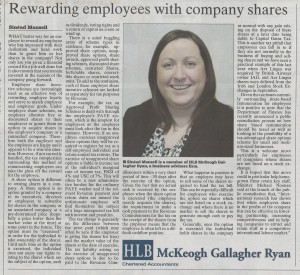HLB McKeogh Gallagher Ryan’s Sinéad Mansell investigates the tax implications of employee share incentive schemes.
What better way for an employer to reward a hard working employee who has impressed with their dedication and hard work than to grant the employee shares in the company? Not only are you given a financial reward for a job well done but it also ensures that you remain invested in the success of the company going forward.
Employee share incentive schemes are increasingly used as an effective way of rewarding employee loyalty and serve to match employee and employer goals. Under employee share schemes, an employer allocates free or discounted shares to their employees or grants them an option to acquire shares in the employer’s company or a connected company. Therefore both the employer and the employee are happy and it appears to be a win-win situation. However, if not correctly handled, the tax complexities surrounding this method of remunerating employees can take the gloss off the reward for the employee.
A share option is different to owning shares in a company. A share option is an option granted by a company to its executives, directors or employees to subscribe for shares in the company or an associated company at a pre-determined price (hopefully a price lower than the market value at the time) at some point in the future. The option must be “exercised” in order for the individual to take ownership of the shares. Until such time as the option is exercised, the individual does not enjoy any rights relating to the shares which are the subject of the option, such as dividends, voting rights and a return of capital on a sale or wind up.
There is a mind boggling array of scheme types in existence e.g. Approved Share Options, Unapproved Share Options, Share Awards, Approved Profit Sharing Schemes, Discounted Share Schemes, Restricted Shares, Forfeitable Shares, Convertible Shares, Restricted Stock Units etc. To add to the confusion each of these employee share incentive schemes are looked at separately for tax purposes by Revenue!
For example, the tax on Approved Profit Sharing Schemes is dealt with through the employee’s PAYE system which is the simplest for employees as the employer must look after the tax in this instance. However, if an employee exercises Unapproved Share Options they will be required to register for tax as a self-employed individual and return annual tax returns. The exercise of Unapproved Share Options is liable to Income Tax at the individual’s marginal rate of income tax, PRSI of 4% and USC of 7%. This will often be a new administrative burden for the ordinary PAYE worker and if the relevant Revenue payment and return dates are missed the unfortunate employee will find themselves the subject of a large unexpected tax bill with interest and penalties!
The tax charge is generally on the difference between the price paid (which may often be zero if the employer is giving the shares for free) and the market value of the shares at the date of exercise. The tax liability arising on the exercise of Unapproved Share Options is due to be paid to the Revenue Commissioners within a very short period of time i.e. 30 days after the exercise of the option. Given the fact that no actual cash is received by the employee when the share option is exercised (the employee merely acquires the shares) the requirement to make a cash payment to the Revenue Commissioners for the tax on the receipt of the shares from the employer means that the employee is often left in a difficult cashflow position. What happens in practice is that an employee may have to sell some of the shares acquired to fund the tax bill. This can be especially difficult for employees who exercise the option on shares which are not listed on a stock exchange and where there is no market to sell the shares to generate enough cash to pay the tax.
Generally, once the option is exercised the individual holds shares in the company as normal with any gain arising on the disposal of these shares at a later date being liable to Capital Gains Tax. This is another tax pitfall that employees can fall in to if they are not normally in the business of buying and selling shares and we have seen a practical example of this last year when Aer Lingus was acquired by British Airways owner IAG, and Aer Lingus shares were delisted from the Irish and London Stock Exchanges in September.
At the time of the takeover all Aer Lingus shareholders received a cash payment of €2.50 for each Aer Lingus share they held. All Aer Lingus shareholders who received a payment for their shares were required to pay any Capital Gains Tax (CGT) liability arising on the disposal of these shares to the Revenue Commissioners on or before 15th December 2015. The current rate of CGT is 33%. A CGT return is also required to be filed in respect of these disposals on or before 31st October 2016.
Many Aer Lingus shareholders were not aware of the CGT requirements and may already have missed the 15th December 2015 deadline. We have been working with a number of them recently to regularise this and meet the upcoming October 2016deadline.
Given the tax issues currently surrounding share-based remuneration for employees it is positive to note that the Department of Finance has recently announced a public consultation process on how share based remuneration should be taxed as well as looking at the possibility of a tax-advantaged share options scheme for small and medium-sized businesses. This is a welcome move particularly for employees of companies whose shares are not listed on a stock exchange.
It is hoped that this move could in particular help home-grown firms retain key staff. Michael Noonan TD, said at the launch of the public consultation that “International research has shown that when employees share in the profits of the company this can be effective in fostering partnership, increasing competitiveness and in helping companies to attract and retain staff in a competitive international labour market”. Let’s hope that the political goodwill towards a revamp of the tax rules surrounding this form of employee remuneration remains as clearly it is beneficial for all involved if the tax issues can be ironed out.
If you have any queries on the contents of this article please contact Sinéad Mansell or a member of HLB McKeogh Gallagher Ryan’s Tax Department on 061-208050.
A shortened version of this article appeared in the Clare Champion on 24 June 2016.

